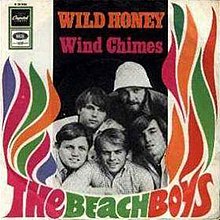"Wild Honey" is a song recorded by the American rock band the Beach Boys. Written by Brian Wilson and Mike Love, it was released as the lead single from their 1967 album Wild Honey, with the B-side of the single being "Wind Chimes". The single peaked at number 31 in the U.S. and number 29 in the U.K.
| "Wild Honey" | ||||
|---|---|---|---|---|
 | ||||
| Single by the Beach Boys | ||||
| from the album Wild Honey | ||||
| B-side | "Wind Chimes" | |||
| Released | October 23, 1967 | |||
| Recorded | September 26–27, 1967 | |||
| Studio | Beach Boys Studio, Los Angeles | |||
| Length | 2:37 | |||
| Label | Capitol | |||
| Songwriter(s) | Brian Wilson, Mike Love | |||
| Producer(s) | The Beach Boys | |||
| The Beach Boys singles chronology | ||||
| ||||
Composition
editIn a 1992 issue of Goldmine, Mike Love explained the idea for the lyrics of the song:
Brian was doing this track with a Theremin and we were doing the song. I went into the kitchen and we were in this health food thing and wild honey was all natural. So there's this can of wild honey and we're making some tea. So I said, I'll write the lyrics about this girl who was a wild little honey. And I wrote it from the perspective that that album was Brian's R&B-influenced album, in his mind. It may not sound like it to a Motown executive but that was where he was coming from on that record. In that particular instance I wrote it from the perspective of Stevie Wonder singing it.[1]
Recording
editRecording for the song began on September 26, 1967 at Brian Wilson's home studio in Bel Air, California with Jim Lockert engineering the session. The song would be almost completely recorded in one day. The band would initially record organ and electric bass guitar courtesy of Bruce Johnston, percussion, tambourine and piano and following that Carl Wilson's lead vocal was overdubbed onto the basic track. The band then recorded instrumental inserts including bongos, percussion and drums, in which Dennis Wilson's bass drum was recorded in a hallway.[2] The session then concluded with the band doing further vocal overdubs and Bruce Johnston performing the organ solo.[3]
Work was resumed on the track the following day with Paul Tanner overdubbing his custom-built Electro-Theremin over the otherwise finished track.[citation needed]
Reception
editBillboard described the single as an "easy rocker with a steady and solid dance beat."[4] Cash Box said that it's a "thumping, pulsing ditty."[5]
Variations
editThe song was first released as a single on October 23, 1967, with "Wind Chimes" as its B-side (except in Greece, where 1965's "The Girl from New York City" was the B-side). It was then released as the first track on Wild Honey in December of the same year. The following year, the song's backing track was released on the Stack-O-Tracks album. The song has appeared on several of the groups greatest hits compilations including the 1999 compilation album The Greatest Hits - Volume 2: 20 More Good Vibrations; the 2003 compilation Sounds of Summer: The Very Best of The Beach Boys as well as the 1993 box set Good Vibrations: Thirty Years of The Beach Boys.
Personnel
editCredits per Craig Slowinski.[6]
The Beach Boys
- Al Jardine - backing vocals
- Bruce Johnston - backing vocals, Farfisa organs, bass guitar
- Mike Love - backing vocals
- Brian Wilson - backing vocals, piano
- Carl Wilson - lead and backing vocals, guitar, tambourine
- Dennis Wilson - backing vocals, drums, bongos
Additional musician
Charts
edit
|
References
edit- ^ Sharp, Ken (1992-09-18). "Love Among The Ruins". Goldmine. p. 19.
- ^ Doe, Andrew G, Tobler, John (2004). Brian Wilson and the Beach Boys: the Complete Guide to their Music. p. 63.
{{cite book}}: CS1 maint: multiple names: authors list (link) - ^ Badman, Keith (2004). The Beach Boys: The Definitive Diary of America's Greatest Band on Stage and in the Studio. pp. 200–201.
- ^ "Spotlight Singles" (PDF). Billboard. October 21, 1967. p. 12. Retrieved 2021-02-24.
- ^ "CashBox Record Reviews" (PDF). Cash Box. October 21, 1967. p. 46. Retrieved 2022-01-12.
- ^ Slowinski, Craig (2017). Endless Summer Quarterly. Vol. 121.